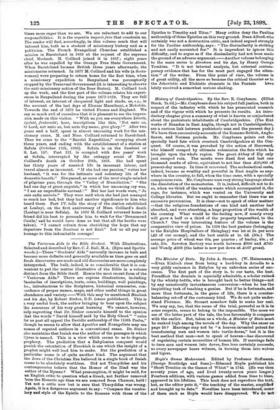The Minister of State. By John A. Steuart. (W. Heinemann.)
—Evan Kinloch rises from being a herd-boy in Arcadia to a. very giddy eminence in Babylon by an unbroken series of suc- cesses. The first part of the story is, to our taste, the best. Proudfoot the dominie is especially admirable, a scholar ruinecl by the whisky-bottle, who is brought back to better things—not by any unnaturally instantaneous conversion—when he has the inspiriting task of teaching a genius. But if he is fortunate, and more than fortunate, in the game of life, there is a counter- balancing set-off of the customary kind. We do not quite under- stand Florence. Mr. Steuart somehow fails to make her real. We may say, too, that the scene of the trial, powerful as it is in some respects, seems to belong to the impossible. The more we see of the latter part of the tale, the less favourably it compares with the earlier. But, taken as a whole, A Minister of Slate must. be ranked high among the novels of the day. Why the sneer on page 58? Marriage may not be "a heaven-invented patent for transforming men and women into turtle-doves," but it is the- best method that man—not to speak of heaven—has discovered of regulating certain necessities of human life. If marriage fails to turn men and women into doves, free love certainly succeeds, as every newspaper bears witness, in turning them into wolves and tigers.


































 Previous page
Previous page